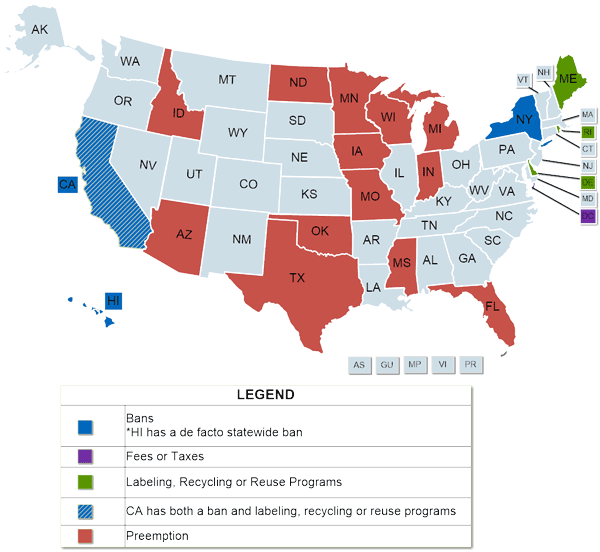Study about Plastic Bans and Fees in USA
In August 2014, California became the first state to enact legislation imposing a statewide ban on single-use plastic bags at large retail stores. The bill also required a 10-cent minimum charge for recycled paper bags, reusable plastic bags, and compostable bags at certain locations. The ban was set to take effect on July 1, 2015, but a referendum forced the issue onto the ballot in the November 2016 election. Proposition 67 passed with 52 percent of the vote, meaning the plastic bag ban approved by the Legislature remains the law. A detailed summary of the law can be found below. Voters also rejected a second measure, Proposition 65, which proposed to create an environmental fund with proceeds from a 10-cent charge for alternative bags.
Hawaii has a de facto statewide ban as all of its most populous counties prohibit non-biodegradable plastic bags at checkout, as well as paper bags containing less than 40 percent recycled material. Bans in Kauai, Maui and Hawaii counties took effect between 2011 and 2013, with Honolulu becoming the last major county to approve the ban in 2015.
New York became the third state to ban plastic bags in 2019 with passage of Senate Bill 1508. The law, which goes into effect March 2020, will apply to most single-use plastic bags provided by grocery stores and other retailers. Bags distributed at the meat/deli counter and bulk food area are exempt, as well as newspaper bags, trash bags, garment bags, bags provided by a pharmacy for prescription drugs, and restaurant takeout bags. The law allows individual counties the option of placing a 5-cent fee on paper bags, with 2 cents going to local governments and 3 cents to the state’s Environmental Protection Fund.
In 2009, the District of Columbia enacted legislation requiring all businesses that sell food or alcohol to charge 5 cents for each carryout paper or plastic bag.
Recycling Programs
States have a long history of pursuing legislation related to labeling, recycling, and reusing plastic bags. In 1991, Maine became the first state to enact legislation requiring recycling efforts at retail stores. The law prevents retailers from supplying plastic bags unless they provide a convenient storefront receptacle to ensure used bags are collected and recycled. Since then at least four other states—California, Delaware, New York and Rhode Island— and the District of Columbia have followed suit.
Legislation Summary
State lawmakers have introduced at least 95 bills in 2019 related to plastic bags. Most of these bills would ban or place a fee on plastic bags. Others would preempt local government action or improve bag recycling programs.


